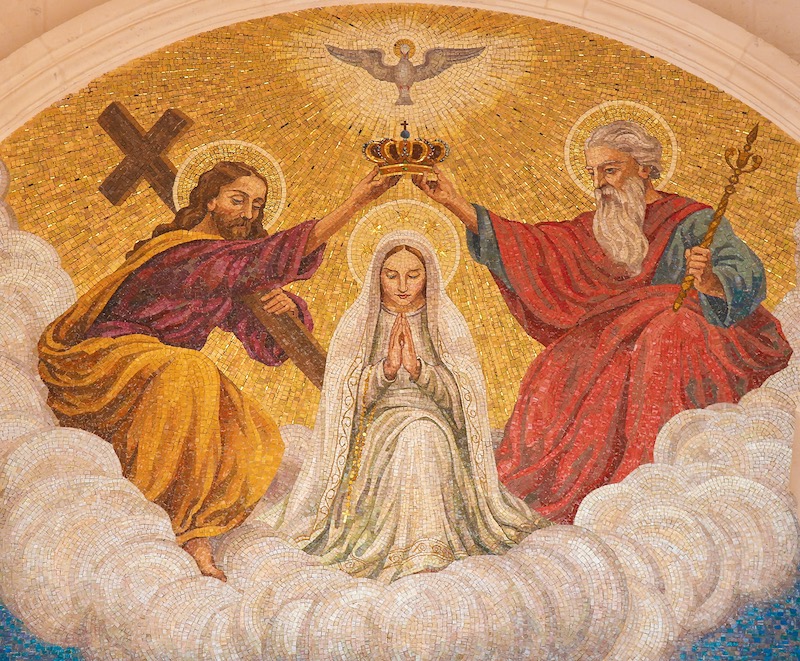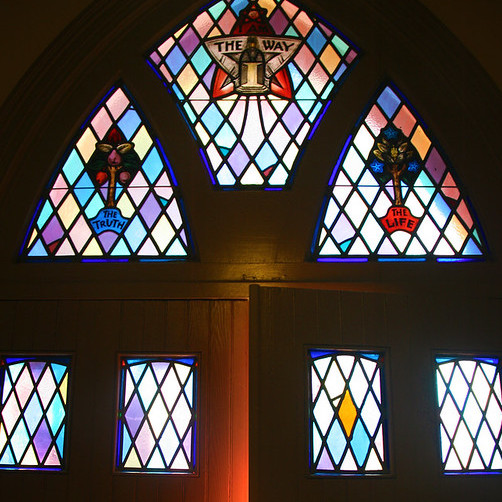This is an unsettling gospel. The ‘door’ to our salvation, we’re told, is open, but not wide; what’s more, it will not remain open indefinitely. We cannot enter, in other words, as and when we please. Time matters; and, of course, we can easily be distracted, not necessarily by bad things, but certainly relatively unimportant things. This gospel, then, is a much-needed wake-up call.
That having been said, it is not intended to cast us into a state of fretful anxiety. Rather, it is intended to steer us clear of both presumption and despair, neither complacently thinking that nothing we do in this life will cost us heaven, nor thinking, like Pelagius, that only what we ourselves do will get us there. Sensibly, we pray during Mass both to be “saved from final damnation” and to be “protected from all anxiety”.
Between the Scylla of despair and the Charybdis of presumption, lies the virtue of hope. Again, one of the prayers of the Mass speaks of waiting “in joyful hope for the coming of our Saviour.” ‘Joyful hope’ is how we are to dispose ourselves, as we journey in this life towards all that God has promised.
Among the so-called ‘theological’ virtues, (‘theological’ because God is both their origin and their goal), we hear a lot about faith and love, but little about hope. St Thomas Aquinas, for one, was in no doubt that hope is crucial to the Christian life: it is, he says, the link between faith and love and love and joy, between what we long for and our final possession of that for which we long. Hope, he says, enables us to look to the future with calm confidence, neither taking the outcome for granted, nor living in fear of the worst. The virtue of hope, he says, “makes us tend towards God both as the ultimate good sought after and as the unfailing source of help in attaining it.”
To live in hope, it has been said, is to be as who peers from the prow of a ship in the direction of a still invisible final goal that lies beyond the horizon, in the knowledge that we are set fair for a destination we can neither arrive at nor as yet see clearly by our own efforts alone. But hope does more than keep our final goal always before our eyes: it enables us to set our hearts on it, while still attending to all that must be done here and now, in the time given to us. The goal is God himself and the perfect happiness of sharing his life for all eternity.
To live in hope is not, of course, the same as being a perennial optimist. Optimism can be an accident of temperament or it can be born of fear for the future. It can also be cultivated. But optimism is never more than skin-deep, a (sometimes) useful strategy: like the senior civil servant who attributed his success to setting his face every morning in an irrefragable smile, until the end of his working day.
The virtue of hope, on the other hand, isn’t something you can cultivate at will or acquire through practice: it isn’t the same as keeping a stiff upper lip or always looking “on the bright side of life”. Hope is a gift, a grace, something for which we should pray. Hope keeps permanently before us the unconditional love that God has had for us from all eternity and his desire for our company for the rest of eternity. Without hope, both living and dying would be unbearable. As St Thomas More wrote in the Tower of London awaiting his execution:
It will not go well with a man in all his affairs in this world if he hath not this mind in him: to show himself content to die and to depart unto God.
But, equally, hope doesn’t dispense us from striving for good and avoiding evil here and now. It doesn’t mean that we can sit back and let God do all the work (which of course he does, but mostly through us). We wisely and needfully pray at Mass to be “kept free from sin” and its deadening consequences, not least the deadening of hope.
But even in the face of our sins, hope keeps us focussed on God’s goodness; and being focussed on God’s goodness is the best antidote to sin. To despair, on the other hand, is, St Thomas says, “to set personal fault above divine goodness and mercy.” “To wallow in our sins”, he says, “is a form of pride, as if, somehow, our sins are too much for God, even though his forgiveness is limitless.” Despair fails to take seriously that God desires nothing more, and works for nothing less, than our salvation.
In the eyes of many, death is the end of everything, including hope. But Christian hope looks beyond even death because it sees in the Cross of Christ not defeat but victory, the victory of selflessness; and in his Resurrection, final proof that “Love is stronger than death.” And it is the victory of him in whose life we share that enables us to let go and love here and now and, when our time comes to die, to trust in God’s infinite goodness, in which we’ve hoped throughout our life. “It is hope”, says St Augustine, “that makes us Christians.”



 Loading ...
Loading ...
What do you think?
You can post as a subscriber user ...
User comments (0)